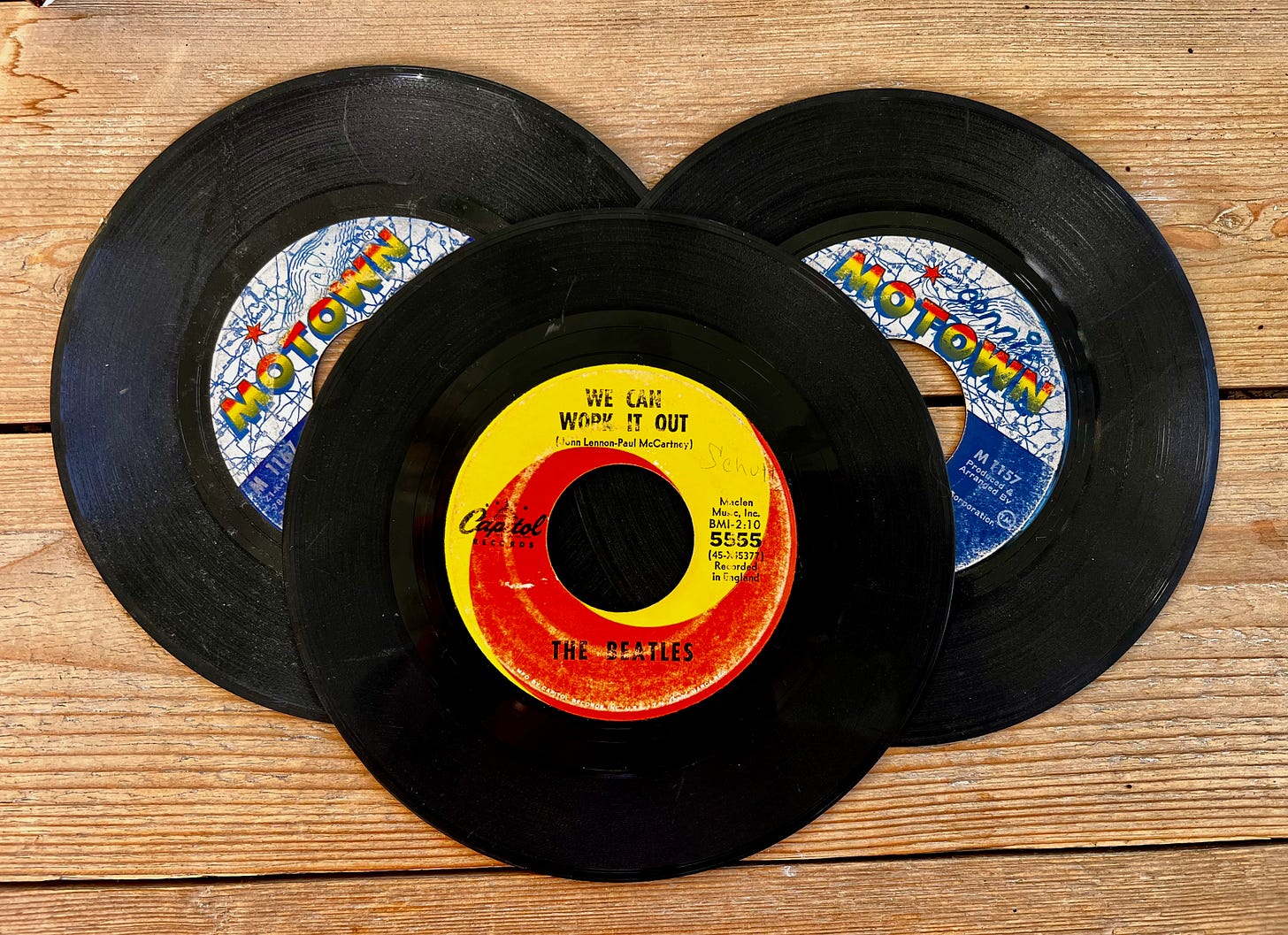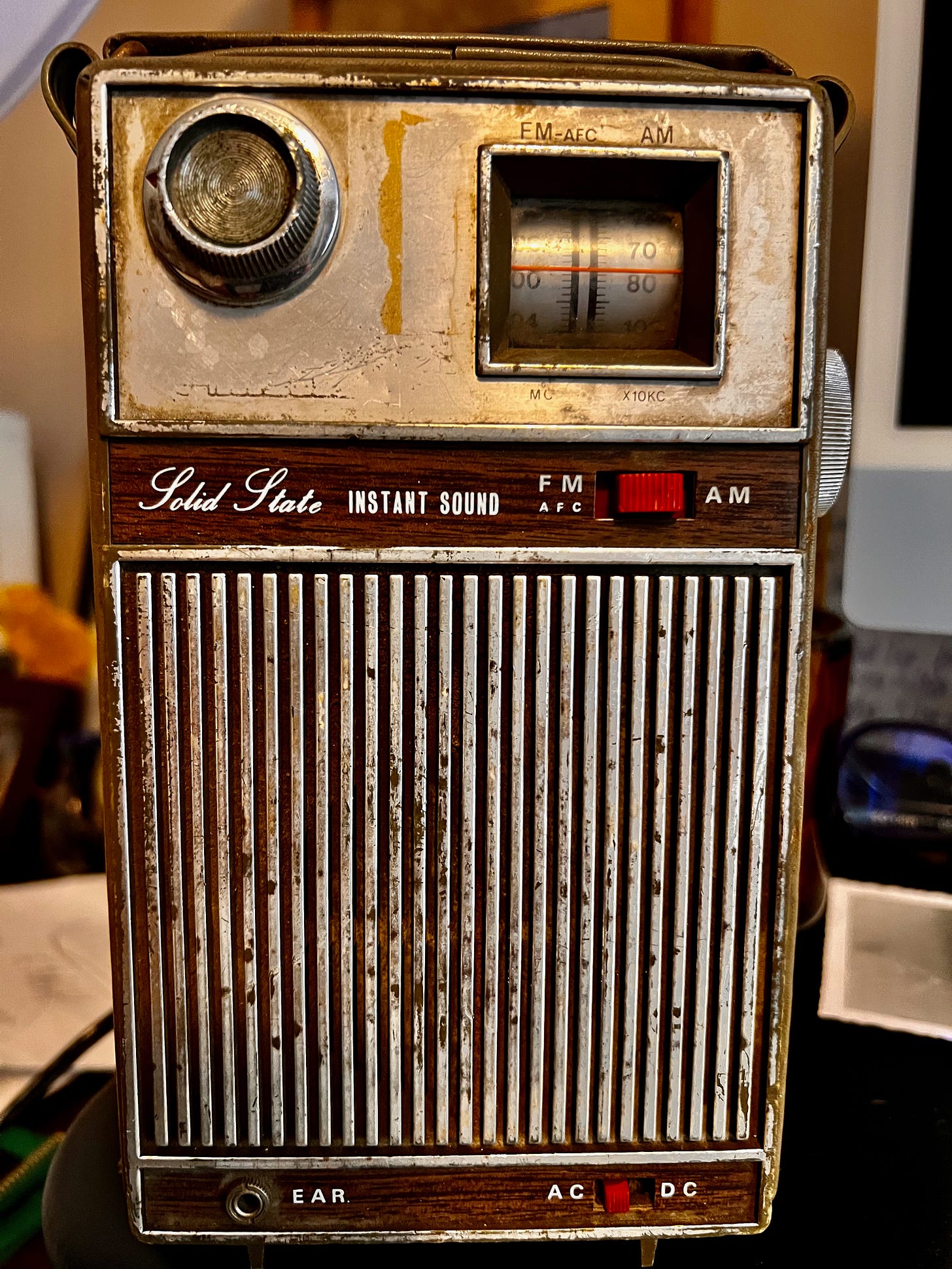Building a Life's Soundtrack, One Song at a Time
My father gave me a love for music, but it grew complicated

A friend asked recently why I seldom write about the influence of music in my life. I had no good answer. He and I talk about music all the time, but I’m not a music critic. I’m shy about sharing my amateur views.
His question got me thinking about how most of us have a soundtrack for our lives. This is surely true for me. There are songs that, as soon as I hear them, pull me back in time. And there are the songs that bubble up in daily life, uninvited.
So often, I find myself humming a song, and at least initially, I can’t figure out why. Last month, for several days, I kept singing the opening lyrics of Paul McCartney’s Let ‘Em In.
Someone’s knockin’ at the door
Somebody’s ringin’ the bell
This was soon after a repairman had fixed a broken lock that made it impossible to open our kitchen door. He came right away, but it was unsettling, that door sealed shut. Maybe that’s why I was singing. However, soon after the lock was fixed, our dog Franklin had a most unfortunate encounter with a skunk. Big mistake, opening that door. Perhaps I was singing a song of regret.
(Confession: Sometimes I start humming a song just to see how long it takes my husband to hum it, too. Little victories.)
Can you remember when you first fell in love with music? For me, it started with my father. He was 20 on the day I was born; my mother was 19. They had been married just five months.
I once had the chance to tell Bruce Springsteen, in a brief conversation he likely doesn’t remember, that I love his song, The River, because it tells the story of my parents’ beginnings. Mom told Dad she was pregnant. In 1957 there were two options in small town Ohio. Dad could abandon my mother, or he could marry her.
They eloped. No walk down the aisle, no flowers, no wedding dress—all true, and Dad got his union card too. I’m ignoring the line about no wedding day smiles, because I can’t bear to think I was their first shared sadness. I cherish a single photo from our early months as a family. All three of us are standing in front of a Christmas tree, and we are smiling. I am in my father’s arms.
I heard music on my father’s car radio whenever he was in it. Pulling into the drive after a day at the plant, or leaving to run errands, play softball, go for a few beers at the Crow’s Nest—the music played. When he wasn’t listening to a song, he was often humming it; when he wasn’t humming, he was whistling.
My father wasn’t very talkative, and he was often angry, but he became someone else in that moment when he fell in love with a song. His brow smoothed, his shoulders relaxed, and sometimes he’d reach over with his giant paw of a hand and push the hair from my face as he sang along. I clung to this version of my father. His music became mine.
My mother didn’t care about music in the same way. She gave birth to four kids in six years, and the Top 40 was the last thing on her mind. In me, Dad finally had a music buddy. He loved the early Beatles, The Dave Clark Five and Neil Diamond. And so did I.
When I was eight years old, Santa gave me a record player. Somehow, on that same Christmas, Mom and Dad knew to give me five 45s and a case to keep my records safe and organized. I remember only one of those first five records: the Beatles’ Day Tripper/We Can Work It Out. It’s sitting on my desk as I write.
On Saturday after most paydays, Dad and I would go to Nichols or Hills department store and pick out another record. I couldn’t wait to get home and slide it out of its paper sleeve. We’d sit cross-legged on the floor and listen to the latest song, humming and nodding our heads.
For my 11th birthday, my father gave me my first transistor radio, encased in padded, olive-green leather. It was a Juliette Solid State Instant Sound, and it played both FM and AM stations. I couldn’t believe it was mine.
My birthday is in the summer, so whenever I wasn’t babysitting my younger siblings or neighborhood kids, I listened to music on my radio. During the days, I looped it around the handlebar of my bike. In the evenings, my radio moved with me. It sat on the kitchen counter as I washed the dinner dishes, then next to me on the porch swing until I was singing in the dark. At bedtime, it played softly on the TV tray next to my bed. Like my father with his songs, the music—my music—followed me everywhere.
The earthquake in our relationship came after I discovered station CKLW in Windsor, Ontario. To this day, I can sing its jingle: CKLW, the Motor Cityeeeee. Motown became the soundtrack of my life. The Temptations, Gladys Knight, Marvin Gaye, Smokey Robinson and the Miracles—the music I used to hear only in the homes of my Black friends was now in my head, and wafting in the air around me everywhere I went.
Soon after I turned 12, I talked a neighbor lady into cutting my hair and giving me a white girl’s Afro. I looked like a human Q-tip, and this was the first of a pile of last straws for my father. For the first time, music—my music—made him angry. I saw this change in him as a rebuke. I fell in love with Motown and Dad stopped loving me. I pasted a Michael Jackson poster on my wall, right next to Bobby Sherman.
We were entrenched.
It took me years after his death, at age 69, to see all that he had thought he was losing. There is no denying his racism, and eight years after he died, I finally wrote about this for The Atlantic. It was one of the hardest essays I’ve ever written, but I was tired of so-called experts depicting racism as inevitable for anyone who grows up white and working-class. Our roots are our beginnings, not our excuses, and I wanted to share how I knew that.
I wanted to believe it was the final word on what had divided my father and me. As I soon discovered, I wasn’t done writing about this tension in the late ‘60s between a white, working-class father and his strong-willed daughter, and so they reappeared as someone else in my novel, The Daughters of Erietown. In wrestling with the mounting friction between Brick and his daughter, Sam, I was forced to see the layers of my own father’s grief.
When I looked back, I could remember the Black artists in Dad’s album collection. Johnny Mathis, Nat King Cole, Ray Charles, and Ella Fitzgerald—he loved them all.
With Motown, though, he’d lost his music buddy, the one person who couldn’t wait to hear the next song that had captured his heart. Worse, I had moved on to music that made no sense to him. Out in the world he was still a young father but to his teenage daughter, he had become an old man. He was hurt, and he didn’t have the words for that.
In my senior year of college, I tried again with Dad. We sat in the living room, and I played him some of my favorite Springsteen songs. He tried to like them, but he felt Springsteen romanticized the hard lives of blue-collar workers.
By then, Dad had worked 20 years in maintenance at the local electric plant. At age 42, he already had bursitis in his shoulder and arthritis in his knees, and often slept on the floor to ease the pain in his back. What could a rock-and-roll star know about that?
More than a decade after Dad died, my sisters and I gathered to go through the last of his belongings stored in giant plastic bins. Under a pile of hundreds of family photos, I found my first transistor radio.
The brand name, Juliette, had been rubbed away by my young fingers adjusting the dial. The radio’s face is dirty and scarred, but when I plug it in, its scratchy voice is as familiar as my mother’s. “Turn it down,” I can hear her yell.
I don’t know why my father saved that old radio, but finding it summoned another memory of him, and I’m grateful for this one. It was the last gift of music he ever gave me. A wedding present, two years before he died.
“So you can listen to your music in the kitchen,” he said, almost smiling as I unwrapped the Bose CD player. “Like you did when you were a kid. No matter where I was in the house, I could hear you sing.”







I certainly didn’t have the same musical relationship w my Father, but as I was growing up I slowly(too slowly in retrospect) became aware of the subtle but pervasive racism in our small N Texas town. My Dad’s parents attitude was that Black’s were still slaves. My Father moved on from that but still supported segregation. But then I noticed that he did small things that belied that. Once I took our cleaning lady home, and he gave me money and said “Get her boyfriend and take them to the third floor of the courthouse to register to vote. Use the money to pay the poll tax“ I asked why. He said they would keep the money themselves if he gave it directly. “They have the right to vote and money shouldn’t stand in the way.”
This is beautiful, Connie. As we age our parents become our peers in many ways and we come closer to appreciating the pain behind their imperfections. At least it is so for me. He was lucky to have you and I bet he realized that.